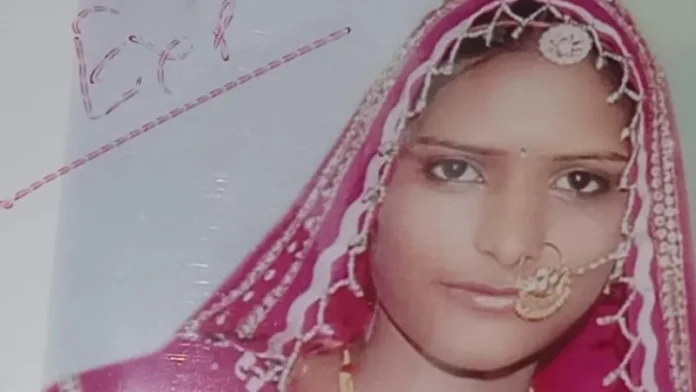The Additional District and Sessions Court in Mavli (Udaipur) has sentenced Kishanlal (also known as Kishandas) to the death penalty for brutally murdering his wife, Lakshmi, in what the judge described as a “heinous crime against humanity.”
The judgment, delivered on September 1, 2025, comes eight years after the incident in Navaniya village, Udaipur, where the 22-year-old Lakshmi was deceived by her husband and burned alive because of her skin complexion.
According to court records, the attack took place on the night of June 24, 2017. Kishanlal, who often taunted Lakshmi for being “kali” (dark-skinned), brought home a plastic bottle filled with a brown liquid, claiming it was a “medicine” to make her skin fairer.
Although Lakshmi complained that it smelled like acid, she trusted her husband and applied it all over her body. He then lit an incense stick, set her on fire, and when the flames engulfed her, poured the rest of the liquid on her body.
Locked inside the room, Lakshmi screamed for help. Her in-laws eventually rushed her to hospital, but she succumbed to her injuries days later.
A Human Rights Advocate via The News Chronicle, September 4, gave a detailed reaction, condemning the act and the mindset behind it:
“It’s a sad reality that colorism is popular in the many cultures and civilizations of the world. A fairer skin is often perceived by ill-informed, or will I say downright ignorant fellows, as better.
This makes no sense, especially because nobody created themselves. I believe in Go,d and I believe there is a reason we were all created differently to serve different purposes. No skin color is better than the other; we are all special in our element.”
Before her death, Lakshmi gave statements to police officers, doctors, and an executive magistrate. She testified that:
-
Her husband routinely mocked her for her dark complexion, calling her “unworthy” of him.
-
He forced her to apply the liquid on the night of the attack.
-
After she did, he mocked her appearance again and set her ablaze.
Her testimony eventually became the central evidence in the trial.
In his strongly worded ruling, District Judge Rahul Choudhary said:
“This heart-rending, brutal crime was not just against Lakshmi, but a crime against humanity. Such cruelty shocks the conscience of society and cannot even be imagined in a healthy and civilised world.”
He added that Kishanlal had “betrayed the trust of marriage” and acted with “excessive cruelty in throwing the remaining liquid on her.”
The court placed the case in the “rarest of rare” category, which justified the death penalty.
Public Prosecutor Dinesh Paliwal, who presented 14 witnesses and 36 documents, called the verdict historic:
“A young woman in her early 20s was brutally murdered. She was someone’s sister, someone’s daughter. If we don’t save our daughters, then who would? I hope this judgment serves as a lesson to society.”
However, Defense Lawyer Surendra Kumar Menariya said his client was innocent:
“Lakshmi’s death was accidental. There is no evidence against Kishanlal, who has been falsely charged. We will appeal the order within the 30 days allowed.”
Miss Abutu also told TNC;
“It’s one thing to dislike a darker skin shade — no issue if that’s your preference and you never want to change your mind about it. But it is another thing to burn or cause harm to another human simply because you don’t like the way they look or appear. A man or woman who does that has no soul and is not worthy to be called a human. Why must you put down another human to feel more worthy, better, or beautiful as a person? It shows that those who do this clearly have a twisted sense of reasoning as well as a seared heart.”
“I am pleased the right was done in this case. It may not solve the perception of colorism on a large scale, but it will teach those with demonic hearts that they have no place with humanity on earth. I only wish this judgment would keep being upheld against perpetrators of domestic violence and hate crimes — not only in India but in other parts of the world.”
Colorism in India
Lakshmi’s death has revealed the reality around colorism in India where:
-
Skin-lightening products form a multi-billion-dollar industry.
-
Matrimonial columns frequently emphasize “fair brides preferred.”
-
Darker-skinned women face ridicule, rejection in marriage, and even abuse.
-
The BBC and other outlets have reported cases of suicide linked to taunting over skin colour.
While awareness campaigns, such as “Dark is Beautiful” and the renaming of fairness creams, have attempted to shift attitudes, activists acknowledge that the fight against this bias is an uphill battle.
The death penalty order has been forwarded to the Rajasthan High Court for confirmation.
Meanwhile, the convict has 30 days to file an appeal.



